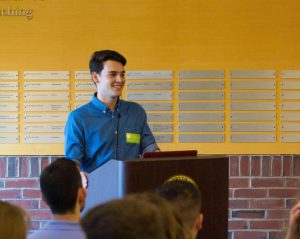Speakers at the bi-annual State of Sustainability commended the university for meeting energy use goals and moving away from fossil fuels while challenging the administration to stop wasteful consumption of water and energy, especially regarding light pollution. Students filled Usdan’s International Lounge on Sept. 25 to hear from Professor Laura Goldin (ENVS), Director of Sustainability Mary Fischer and several environmental clubs on these topics.

New sustainability initiatives will save the school money and resources, making the campus more environmentally friendly than ever despite the student body being larger than ever, said speakers. Brandeis is set to install new solar panels on top of several buildings, including the Shapiro Campus Center (SCC) which, according to Fischer, will decrease carbon emissions by 200 tons each year. The university will be also partnering with a local company to decrease normal natural gas consumption by 10 percent by using recycled fryer oil for heating.
The residence hall being constructed on the site of the Castle will be the greenest building on campus, Fischer said, with 100 percent of heating and cooling coming from geothermal energy supplied by 40 500-foot wells drilled over the summer. Six hundred nineteen pieces of furniture taken out of the Castle before demolition were donated to communities in Honduras, providing needed supplies and saving energy.
Though Brandeis is making efforts to fight climate change and be more eco-friendly, there are significant challenges ahead, speakers said. University venues still sell bottled water and other beverages, contributing to the huge number of plastic bottles that end up in landfills each year. In 2050, Fischer said, the oceans will have more plastic than fish pound-for-pound.
The university’s new “Climate Action Plan,” published in 2016 by the President’s Task Force on Campus Sustainability, stated its support for adding an environmental literacy requirement to the undergraduate curriculum. Their efforts, however, did not prove successful as the new curriculum submitted by the Board of Trustees did not include the proposed requirement.
The Climate Action Plan also asked the university to “[educate] all members of the community about climate change and their role in addressing it here on campus and beyond.” Addressing climate change, they said, “requires that everyone understand that ‘business as usual’ is not an option.”
The Sustainability Committee has also pushed Brandeis to turn off building lights at night, citing pictures of entire academic buildings lit at 2 or 3 a.m. on weekends, which would eliminate a big source of energy waste. This change would need to be made at an institutional level, said Fischer, because some of the lights are automated and just asking janitorial staff to turn of the lights each night is also not feasible solution.
Brandeis is doing much more to improve its footprint now than ever before. Back when Laura Goldin, professor of environmental and American studies, began teaching there were no university sponsored sustainability plans. She recalled how members of the Students for Environmental Action (SEA) club would drive a golf cart around campus to pick up trash and recyclables. There was a disconnect, Goldin said, between the smart and caring students she encountered and the wellbeing of their environment.
Goldin remains concerned about the environment and the way students interact with it. “You cannot use as much as we are using now,” Goldin said. “Every drop of water we use, every bit of emissions we send into the air affects somebody next door.” Sustainability is inherently aligned with Brandeis’ mission and is a “deeply moral responsibility,” Goldin explained, referencing the way environmental issues disproportionately affect people of color and low-income communities. “We should at least have our house in order at Brandeis.”
“How can we talk social justice at Brandeis without having an effective, carefully thought out environmental justice program and sustainability program?” Goldin asked of the audience.
The State of Sustainability began in 2014 and has typically been held at the end of each semester. Benedikt Reynolds ’19, Chair of the Senate Sustainability Committee, explained that hosting the event at the end of the semester sacrificed an important opportunity for club collaboration. Moving the event to the beginning of the semester allows clubs to meet and start brainstorming ideas early on.


